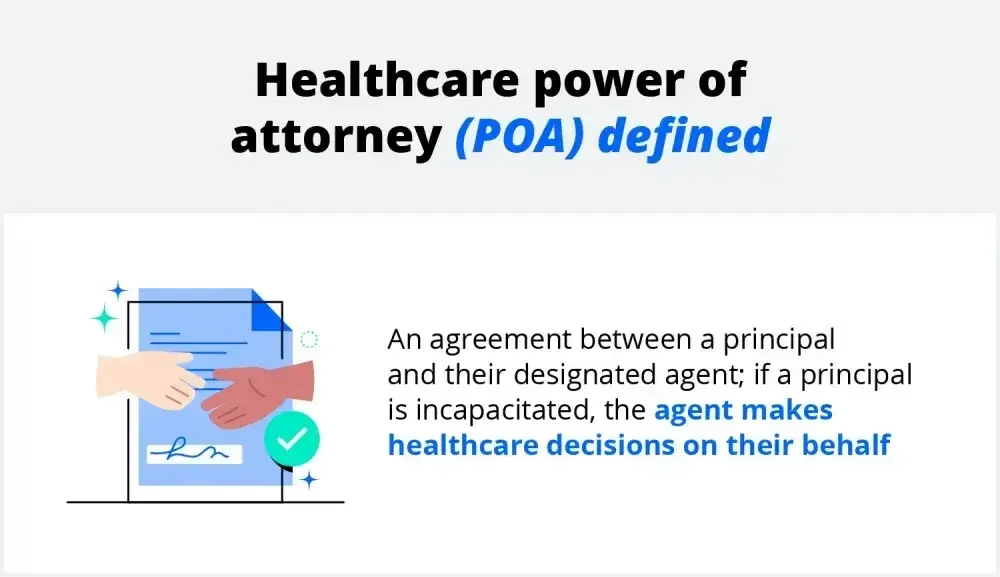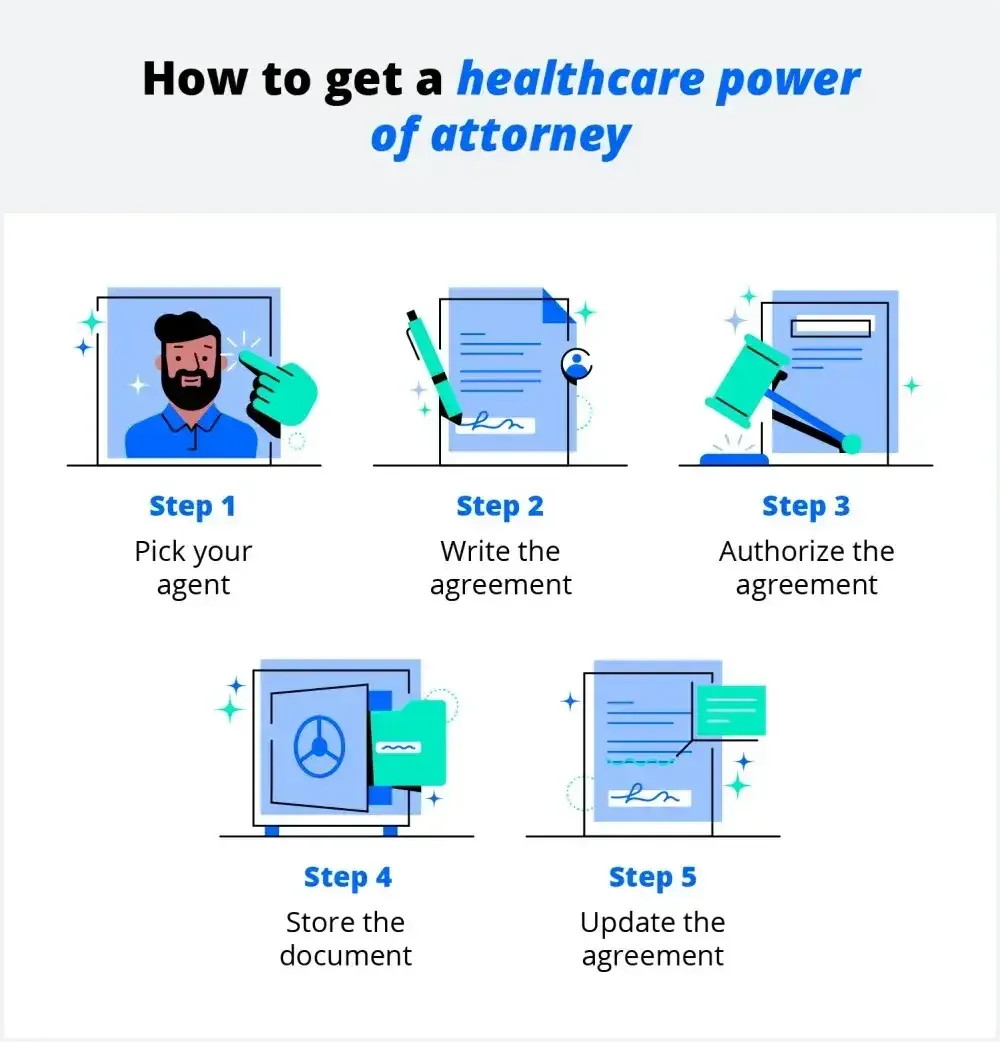In a medical emergency, patients need the chance to pick their preferred treatments. But incapacitation and unconsciousness can keep you from acting as your own self-advocate. In times like these, you need a reliable medical proxy to work on your behalf. For that, you need to fill out a healthcare power of attorney form.
Appointing a healthcare power of attorney helps ensure that providers offer your preferred treatments. To help you along, we'll explain a medical power of attorney's definition, capabilities, and legal considerations.

What is a medical power of attorney?
The healthcare power of attorney form is a legal agreement between two parties:
- A principal: Someone who assigns a representative in medical emergencies.
- An agent: An individual who steps in when the principal can't make decisions about their health care.
In the most basic form, a healthcare power of attorney is a legal document that essentially says, "I want this person to make decisions about my health care if I am unable to do so."

Why is healthcare power of attorney necessary?
Healthcare power of attorney is one of the most widely recognized medical directives. These healthcare proxies step in during cases of:
- Temporary unconsciousness
- Permanent vegetative states
- Terminal illnesses
- End-stage conditions
- Conditions that inhibit communication
How is a medical POA different from a living will?
Health care power of attorney goes further than a living will, such as one drafted by an estate planning attorney. A living will only applies if you are terminally ill, permanently unconscious, or in another similar condition defined by state law. A health care power of attorney can assist you at any level of illness. Your agent can also make decisions you didn't outline in a living will. Taken together, a medical power of attorney and living will are known as an “advance directive.”
Medical power of attorney rights and limitations
To better understand why you'd want a medical power of attorney, we'll break down their abilities and drawbacks.
What your medical proxy can do
In addition to assisting with your treatment, a healthcare power of attorney can decide the following:
- What medical treatments you receive: Proxies take your desired medical outcomes and their ideal course of treatment in mind, including pain management or surgeries.
- Which procedures you want to refuse: A power of attorney lets your proxy refuse undesirable, painful, or unaffordable care.
- Where you prefer to get medical treatment: Proxies can route or transfer you to a certain facility.
- Which providers oversee your treatment: Your power of attorney agreement lists preferences for doctors and other medical providers.
- Who has access to medical records: Friends or family members you choose will be able to view and share your medical records as needed.
Limitations on healthcare POA
Medical power of attorney agreements face some limitations. For example, healthcare agents:
- Won't always make the right decision: Your proxy can make a mistake or choose an option you wouldn't have preferred.
- Cannot alter the principal's estate planning documents: Without a general power of attorney, your agent is limited to healthcare decisions and cannot alter other parts of your estate plan.
- Cannot transfer POA power: If a proxy wants someone else to take over, that person needs the principal's consent.
Picking a trusted healthcare agent
Your healthcare agent is a person you trust with decision-making authority over your medical care. You want an agent who will always act in your interest. Choosing a reliable agent is crucial, and you should think carefully about a few people in your life who could assume this responsibility.
This person may decide whether you accept life support measures and may choose how your personal and religious values impact other treatments. When the hardest questions are asked, it’s your healthcare agent who will be called to answer, so keep the following considerations in mind:
Your agent won't always know what you want
If you don't write a living will or include specific provisions in your POA agreement, it's up to the person you designate to determine what you want in specific medical situations.
To help your agent make the right calls, consider writing an estate plan, such as a living will, or adding preferred treatments to your agreement. Stating what you would like simplifies crucial decision-making and avoids confusion in the event that you are incapacitated.
You can appoint more than one agent
You aren't limited to only one power of attorney at a time. You can appoint multiple agents for different purposes or write multiple agreements of the same type. In the agreement, you can stipulate whether:
- Any power of attorney can act on your behalf
- All agents must reach a collective decision
Remember that more agents aren't always more efficient. For example, if the agent disagrees with a medical choice, such as whether you want want to receive cardiopulmanory resuscitation (CPR), that can slow potentially life-saving decisions.
Your agent isn't always liable for his or her actions or inaction
After appointing an agent, he or she can generally refuse to make choices on your behalf. Alternatively, your agent may make decisions you don't necessarily want. To avoid disagreements, make sure your agent understands your wishes and can handle the pressure. While there are exceptions, in most cases, an agent isn't liable for making medical decisions the principal doesn't agree with.
How to get medical power of attorney
Appointing a medical proxy can take time, but the process is straightforward. You can set up a healthcare power of attorney agreement in five steps.

1. Pick your agent
The best medical proxies understand your wishes and will act on them. Choose a trusted friend or family member who's up to the challenges this role brings. Explain what goes into the agreement and ensure that the person understands it before proceeding.
To legally qualify as a healthcare proxy, your agent must:
- Be 18 years or older
- Demonstrate sound mind
- Go through the state's official notarization process, if required
2. Write the agreement
You can find your state's healthcare POA form online and at large medical centers. After you receive it, take your state's medical power of attorney form and enter your:
- Personal information
- Agent's details and contact information
- Basic medical provisions
- Living will, if you have one
The more details you provide, the easier your agent's job becomes. Ironclad legal documents help ensure all your medical wishes are granted. While this process can be done on your own, using a service or hiring an experienced attorney ensures that the agreement will hold up if need be.
3. Execute the form according to state laws
After completing the document, you need to get it authorized. Each state has a different procedure, but executing an agreement may involve:
- Getting the principal's and agent's signatures
- Notarizing the document with a state official
- Conducting the process in front of one or more witnesses
You can find these requirements on the POA form or by speaking with an attorney. Even if your state doesn't require witnesses or a notary, the extra authorization strengthens the agreement and can also help prevent legal challenges.
4. Safely store the document
Once you complete the agreement, store it as you would other legal forms: in a safety deposit box, home safe, or with your attorney. Your agent should know where to get the healthcare power of attorney form if you get sick. Healthcare providers may only listen to your agent if she or he can prove the power of attorney form exists.
5. Update the agreement as needed
If you change your mind about any provisions or your choice of agent, update the agreement. After you make the changes, re-notarize your updated document. Otherwise, providers may fall back on the outdated form.
Considerations for your healthcare POA
To make the most of your medical power of attorney, we'll explain power of attorney agreement changes, notarization, limits, and combinations with living wills.
Know you can change or revoke your POA at any time
Once you appoint a medical proxy, you aren't required to keep that person on. Principals can refuse treatment suggested by the agent at any time. However, if the principal is incapacitated, providers make health care decisions on the agent's word alone. To avoid treatments or medical supervision you don't want, principals can:
- Notarize updated agreements at any time
- Destroy their power of attorney agreement
- Submit a letter revoking past medical POA forms and get it notarized
Understand the limits of a medical POA
Healthcare power of attorney can outline which medical procedures you'd like, but medical proxies still face limitations. Your finances and estate plans stay outside a healthcare proxy's reach.
If you want to grant broad powers to an agent, you must grant that person general power of attorney. This agreement offers additional rights and powers, such as allowing your agent to prepare your affairs and assets for what happens after your death. Effectively, general power of attorney lets an agent do anything the principal can.
Combine it with a living will for the best coverage
You can simultaneously use a living will and healthcare power of attorney. In fact, some official state forms combine the two. These forms provide room for other medical questions, such as:
- The designation of a primary physician
- The preferences regarding organ donation
- Whom you would like appointed as your legal guardian if the need arises
- The time frame of any medical treatments you receive
State-specific considerations
While medical proxies perform the same tasks across state lines, different regions set slightly different policies. We'll break down a few state-specific guidelines to keep in mind.
Meeting notarization requirements
If your medical POA agreements aren't signed in front of a licensed notary, medical providers may disregard them. States generally take one of three stances on notarization:
- No notarization standards—mutual agreement will suffice
- The document requires notarization from one official
- The document needs notarization in front of one or more witnesses
Research your state's guidelines to ensure your power of attorney agreement meets the criteria.
Including disclosure statements
Advance medical directives, including power of attorney, need to include a disclosure statement in some states. Without this disclosure, providers may disregard the medical POA form. Additionally, each state has a unique disclosure. These states include:
- Ohio
- Texas
- Wisconsin
- New Hampshire
By attaching the disclosure to your form and signing an acknowledgment, your medical proxy won't run into any issues.
Moving across state lines
If you move to a new state, old agreements often stand. That said, you should still update the form in your new state of residence. This update can address slight changes in state law and provide updated contact information and addresses.
Placing healthcare choices in the right hands
Thinking about medical emergencies can be challenging. But by planning ahead, you can secure the best course of treatment with healthcare power of attorney. When you create a medical power of attorney and choose the right person to act as its agent, you do more than give yourself and your loved ones peace of mind—you ensure you’ll have an advocate to push for the medical care and treatments you’d want.

